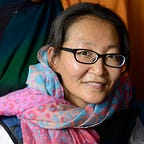Pacific Food Systems Summit– WFP support to building more inclusive and resilient food systems
Faced with complex problems that call for game-changing solutions, a look at the Pacific’s food systems and WFP’s support to the regional and national dialogues ahead of the first-ever UN Food Systems Summit in September this year.
Written by: Maria Shumusti
The year 2021 has emerged as a pivotal moment to rethink and transform how the Pacific island countries and territories produce and consume food, and how they might build more resilient, inclusive and sustainable food systems in the future.
The Pacific is a region that remains challenged by the impacts of recurrent climate shocks and the increasing health and socio-economic impacts of COVID-19 on its people and food systems.
This is in addition to prevailing factors such as geographic remoteness, challenges in food production and access necessary for a healthy and diverse diet, dependence on imports and high rates of non-communicable diseases. The food systems dialogues present an opportunity to discuss these challenges, highlight the importance of indigenous knowledge and practices, and need for collective action and transformative reform.
In Fiji, WFP Programme Officer, Anare Motokula, provided technical and online facilitation support to all five Action Track dialogues and supported the Ministry of Agriculture team in their submission to the main summit. As the global anchor for Action Track 5 building resilience to shocks and stressors, WFP also co-presented on the importance of climate science data and potential of parametric insurance to build resilience for vulnerable populations.
During the regional dialogue in the Pacific led by the Pacific Community, WFP Programme Coordinator Ms Amra Lee was a panellist at the dialogue bringing attention to the importance of disaggregated data in understanding food and nutrition security, and social protection measures for a more inclusive and equitable future in the Pacific.
“Since COVID-19, WFP’s food security monitoring data has shown inequality in food security and nutrition outcomes for some households,” said Amra.
“The data underlines the need to strengthen social protection measures in order to achieve zero hunger as required by Sustainable Development Goal 2 (SDG2), ensuring that nobody is left behind.”
Deliberating solutions to build more sustainable, inclusive and resilient food systems not only has the potential to improve the livelihoods of people engaged and their environment, but also the quality and nutrition of food on all tables across the region.
The UN Food Systems Summit will seek to launch bold new actions and solutions to deliver progress on SDG 2 Zero and ensure no one is left behind. The Summit process hopes to jumpstart a transformation in the way the world produces, consumes and thinks about food.
